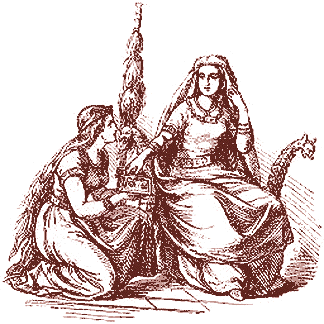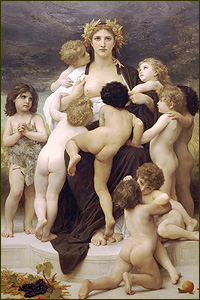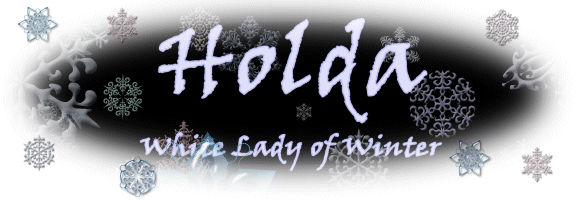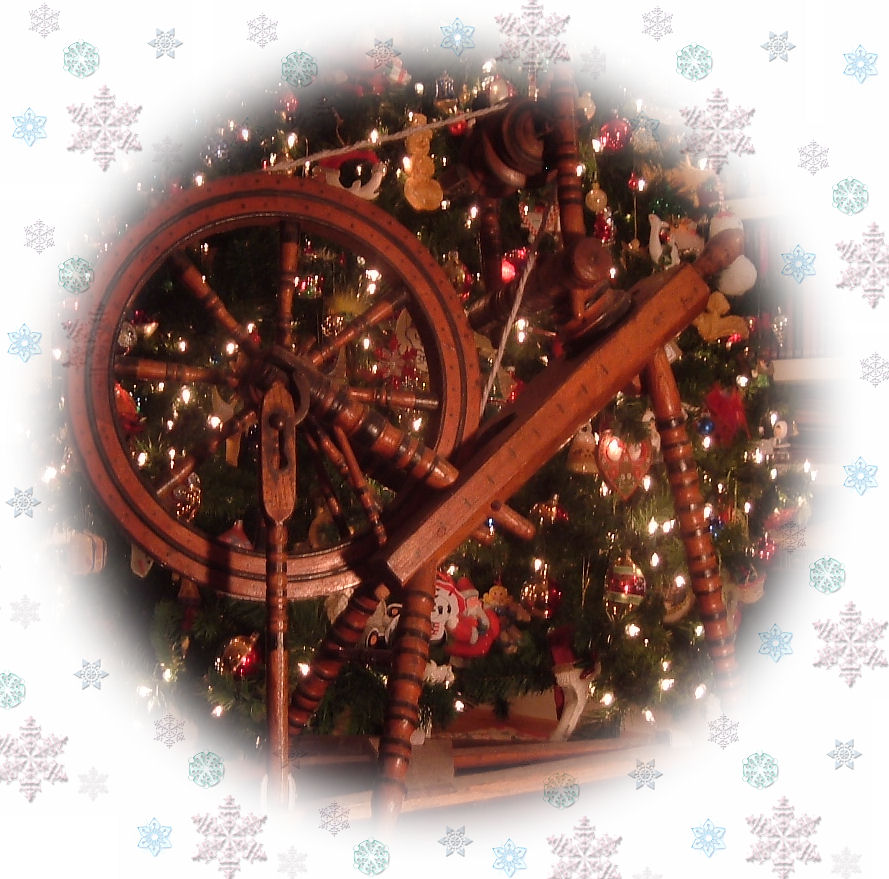| Mother
Holda (Frau Holda) is a highly revered and very misunderstood Teutonic
Goddess. In old German households she brought on Winter, rewarded the
industrious
and carried infants that died to the Heavens. She is a symbol of virtue
and hard work. Holda is perhaps the only Teutonic Goddess whose worship
survived until today (1). Her association with the home and women may
be
what caused her to be much maligned in modern times. I hope her story
here
helps bring her back into the Light.
Images
of the White Lady of Winter
Holda
means “gracious one”. She resides in the sky, riding her chariot
through
the night. Her chariot is pulled by many animals of the wood and she is
accompanied by the infants that died before they were named. She is
seen
as a beautiful woman with long white hair bathing in a clear pool to
the
good hearted and hard working. But to the lazy and unkind she appears
as
a wizened old woman. She is sometimes seen as a woman with two faces;
one
young and beautiful, one old and stern. In either manifestation, she is
not a lithe spirit. She is of sturdy stock, at par with her sisters to
the North. My favorite portrait
of Holda (see links below) was done by Neil Geddes-Ward.

courtesy of Odin’s
Gifts
Protector
of the Home
Holda
is protector of the household and patron of the housewife and mother.
She
holds hard work above all else. Spinning, being the main industry of
the
housewife, is her favorite pastime. She promotes the independence of
housewives.
Before the industrial revolution, spinning and selling their goods was
the only way housewives could get money of their own. “It is hard for
us
to understand the central importance that spinning played in the lives
of women before the Industrial Revolution” writes Paxson (4). Women
would
pray to Holda to help in this endeavor. There are many ancient tales
(pre-Brothers
Grimm) where Holda brought reward to the hardworking and virtuous,
fertility
to the fields and animals and protection to women and children.
Bringer
of Weather
Thorn
(1) writes, “Holda is believed to cause many natural phenomena. Snow
was
caused by her shaking her feather bed, (B, C) fog was the smoke from
her
fire. When it rained it was Holda’s washing day and lightning was heard
when she worked at her flax. It was also said that she made the fields
fertile and awoke the apple trees in the spring.” Holda has a magic
well.
Women could come to ask for help in conceiving children. Hard working
children
who visited the well would be rewarded with prizes from the well. Lazy
children must beware!
From
Gracious Lady to Halloween Hag
So
how did this lovely Goddess become the “Goddess of the Witch’s”, an
ugly
hag, riding her broom through the night sky? Many ancient customs, Gods
and Goddesses have been misunderstood by historians – or adopted and
morphed
by the cultures that came later. But post-Christian documents seem to
make
a special effort to demonize “the Gracious One”. It is perhaps Holda’s
association with the housewife that caused this special attention. It
is
my personal conclusion that Holda was demonized to discourage
independence
in housewives. No where is this demonization more clear than in
“Sleeping
Beauty” where the spinning wheel and spindle are turned into symbols of
evil. Many of her other attributes were turned around (5) as well. Her
protection of the dead soul of infants was turned around to her
creeping
in and stealing children from their cradles. Her image as wise old
woman,
instilling moral values turned to the foolish old Mother Goose who
spreads
wives tales.
I
could go on…but please just remember…Holda is not the “Leader of the
Cult
of Witch’s” as portrayed by the church of the 15th century (2). She is
a noble and gracious Goddess worthy of your praise as worshipped by the
ancient Teutons.

"Alma
Parens", Painting by William Bouguereau (1825-1905)
Images
Please
take a minute and browse these other images of Holda.
A.
Frau Yule
http://www.christmas-treasures.com/duncan_royale/duncan/SantaII/frau.jpg
B.
Holda Making Snow (from a children’s Story)
http://www.kidsnet.at/Sachunterricht/holund1.jpg
C.
Holda Making Snow
http://www.thorshof.org/holdapic.htm
D.
Holda Drawing Down the Snow
http://www.neilgeddesward.com/shop.php?category_id=&product_id=4&start=0
Correspondences
Other
Names: Frau Holda, Frau Holle, Winter Goddess (C), White Lady,
Mother
Yule (A), Hulde
Attributes:
Virtue, Motherhood, Wisdom
Season:
Winter, Yule
Symbols:
Spindle, Spinning Wheel, Flax, Geese, Apples, Milk, Elder Tree,
Elderberry
Tea
Colors:
White, Ice Blue
Symbols:
Snow, Snowflakes, Well
False
Names or connections: Holda is not Hel, Perchta, Berchta, Frigga,
Witch’s
Goddess, nor The Hag that rides through the night on her broom
(3).
Honoring
Holda
Holda
is closely associated with Winter and Yule as it is Holda that brings
the
snow. Holda can tell the naughty children from the good and rides thru
the sky on Yule Eve. You honor Holda anytime you give of yourself
in your housework and cooking. Any work around the house can be
done
in Honor of Holda.
An
excellent ritual to Holda would be a whole day affair. Take a day
between Yule and New Years to clean the house and prepare for your New
Year celebration. Burn red candles throughout the house with
spicy
scents. If there is anything left of your Yule log, use it to
keep
the house warm this day. Pause in the middle of the day to spend
sometime with your pets or the outdoor animals. End the day by
eating
spicy ginger cakes (gingerbread or covered in lots powdered
sugar.
Drink milk or Elderberry Tea. Remember Holda as the powdered
sugar
"snows" all over the place! Honor Holda by keeping New Years Day
as a day of rest and celebration.
Holy
Holda, by Diane L. Paxson
Holy
Holda, in the Heavens
A
snowy featherbed you're shaking --
Bless
the earth with your white blanket,
Moist
the mantle you are making.
Holda
high above come riding,
Your
Wagon rolls through winter weather,
Turn
away you face of terror,
Bless
us as we bide together.
Holy
Holda, here we gather,
Send
us skill in all our spinning,
Huldrefolk
to help in housework,
Wealth
and health with you aid winning!
Original
Art
"This spinning
wheel was made by my greatgrand father.
He was a Volga German. The color is from a vegetable stain made with
carrots.
It is pictured in front of our Christmas Tree."
Sources
Footnotes
(1)
Thorskegga Thorn, “Holda” http://www.thorshof.org/holda.htm
(2)
Edward Hilton, “Winter Goddess” http://des.users.netlink.co.uk//winter.htm
(3)
The space is too short here to explain why Mother Holda is not the same
as the Goddesses named. I have not issue with Witches. Holda's ugly
image
did not come from Pagans. If you are interested in how I came to these
conclusions…please write me at pixelluna@oddpost.com)
(4)
Diana L. Paxson, Idunna 30, 1997 http://www.hrafnar.org/goddesses/holda.html
(5)
“Northern Tradition and the Natural Lore” http://home.no.net/hagalaz/tradition.htm
Other
Reference
Patricia
Telesco, 365 Goddess
“Holda
and the Cult of Witches” http://www.ealdriht.org/witchholda.html
“Elder
Tree” http://geoling.earldriht.org/herbel.html
“Riding
with Holda”
http://www.beliefnet.com/story/118/story_11889_1.html
Gene
C. Toews, “The Christmas Myth: Archaic Roots of Present Day Rituals"
http://headlinemuse.com/askhermes/holidays.htm

Be
sure to
read this version of the Night Before Yule.
Richard De
Angelis,
“A Visit From The Yule Spirits”
http://www.ladybridget.com/mp/yulevisit.html
Copyright
2005
Majka
Zmaj
|


